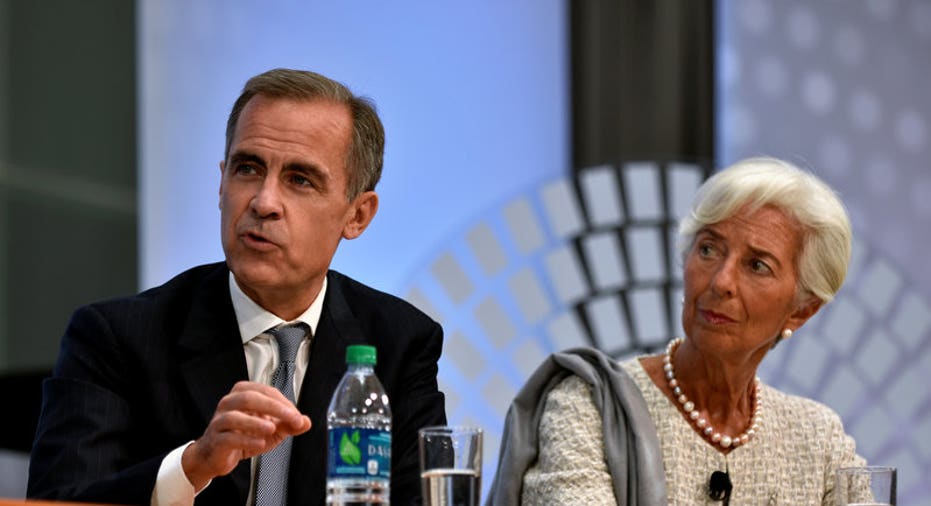IMF, global finance leaders fret over populist backlash

WASHINGTON – World finance leaders on Thursday decried a growing populist backlash against globalization and pledged to take steps to ensure trade and economic integration benefited more people currently left behind.
Their comments at the start of the International Monetary Fund and World Bank fall meetings signaled frustration with persistently low growth rates and the surge of public anger over free trade and other pillars of the global economic system.
The meetings are the first since Britain voted in June to leave the European Union and U.S. billionaire Donald Trump secured the Republican presidential nomination with a campaign that attacked trade deals.
"More and more, people don't trust their elites. They don't trust their economic leaders, and they don't trust their political leaders," German Finance Minister Wolfgang Schaeuble said during an IMF panel discussion in Washington.
"In the UK, everyone from the elites told the people, 'don't vote for a Brexit.' But they did."
Schaeuble said Germany was trying to "hold Europe together" in the face of rising nationalism, and failure to do so would bode poorly for global economic cooperation.
Last week, the World Trade Organization slashed its global trade volume growth forecast to the slowest pace since 2007, saying it expected it to rise just 1.7 percent this year, down from the 2.8 percent it forecast in April.
FEARS OF PROTECTIONISM
On Thursday, Latin American finance ministers also expressed concerns about growing protectionist sentiment in advanced economies that threatens to sink trade agreements such as the 12-country Trans-Pacific Partnership, which includes Mexico, Chile and Peru.
"There are isolationist trends in Europe and sadly so in the U.S.," Argentine Finance Minister Alfonso Prat-Gay told a panel during the IMF and World Bank meetings, holding out hope that cross-border investment within Latin America could still grow.
IMF Managing Director Christine Lagarde launched the meetings by renewing her call for countries to further boost growth by increasing spending when possible, keeping interest rates extraordinarily low and implementing pro-business reforms aimed at improving economic efficiency.
Lagarde singled out Canada, Germany and South Korea as among the nations that could afford to sustainably increase spending, but said that others with no additional capacity could rearrange their budgets towards infrastructure and education programs.
Asked to comment on the dangers to the global economy if Trump wins the White House in the November election and follows through on his pledges to renegotiate trade deals and enact punitive U.S. tariffs, Lagarde declined to give a direct answer.
"I simply note that trade has been in the main a great engine for growth," she said. "We need that engine in order to support and accelerate growth."
The IMF this week kept its global growth forecast unchanged at a relatively low 3.1 percent for 2016 and 3.4 percent for 2017, noting that the U.S. economy had performed worse than forecast while some emerging markets had done somewhat better.
On Thursday, Bank of England Governor Mark Carney said policymakers now have a better recognition of the need for their actions to "more immediately, tangibly and clearly, transparently benefit larger segments of the population."
However, he said that a major new global coordinated policy effort was not likely to be struck at the meetings in Washington.
"I don't think it's realistic, nor do I think it's what people are asking for, that there is a global grand bargain that is struck in an international meeting that then delivers," Carney said on a panel with Lagarde, Schaeuble and People's Bank of China Deputy Governor Yi Gang.
DEUTSCHE BANK'S SHADOW
Worries over the health of Deutsche Bank's balance sheet cast a shadow over the meetings, with Lagarde saying Germany's largest lender needed to re-examine its business model in an ultra-low interest rate environment.
Deutsche has faced a crisis of confidence since the U.S. Department of Justice late last month demanded $14 billion in fines over its sales of faulty mortgage-backed securities in the run-up to the 2007-2009 financial crisis.
The bank is fighting the fine but may have to turn to investors if more money if the penalty is imposed in full.
Schaeuble, asked directly whether the German government was prepared to bail out Deutsche, declined to comment, saying it was "the wrong question."
(Reporting by David Lawder; Additional reporting by Gernot Heller, Leika Kihara, Jan Strupczewski, Jason Lange and David Chance in Washington; Editing by Paul Simao)



















